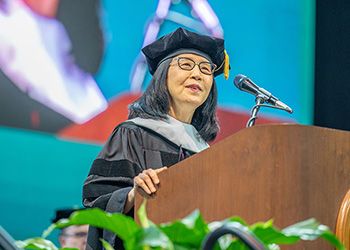McCord Foundation Partners on Tropical Disease
February 12, 2009


Thanks to a grant from the McCord Research Foundation, an MSU researcher will expand his work on the causes and transmission routes of a devastating tropical disease known as Buruli ulcer to also reduce the social stigma of the condition which impacts thousands of people, often children, throughout West Africa. Entomology Professor Richard Merritt will use a portion of the $143,000 grant to develop education and family support programs aimed at teaching families how to identify and seek medical intervention for Buruli ulcer in its early stages.
Established in 2008, the McCord Research Foundation is the philanthropic arm of McCord Research, supporting programs and causes close to the hearts of Darlene McCord, Ph.D., and James McCord, Ph.D. The foundation currently supports independent labs working on Buruli ulcer research.
“We are honored to fund the excellent work Dr. Merritt and his team are undertaking with regard to Buruli ulcer,” Darlene McCord said. “This disease ruins entire families’ lives, and the more we know about it, the better chance we have of stopping it.”
The bacteria responsible for Buruli ulcer - Myocobacterium ulcerans - is a genetic cousin to the bacteria that causes leprosy and tuberculosis. As with leprosy, patients with Buruli ulcer can develop painful and unattractive sores on their bodies that can eventually cripple and even kill them.
More common in children than adults – about 70 percent of those with the disease are younger than 15 years old – Buruli ulcer mainly affects children in poor, rural areas. The disease also often destroys the social and emotional lives of school-age children because they are isolated from family and friends. Most aren’t even allowed to attend school due to their condition.
Darlene McCord has invested her own research energy into creating a topical wound care product that can effectively treat and heal the ulcer once it’s established. Her hope is that this treatment will become obsolete—that no child will have to suffer the physical and social hardship associated with contracting Buruli ulcer.
In addition to helping to support Merritt’s research into how Buruli ulcer is transmitted, the McCord Research Foundation grant will allow MSU researchers to work with staff in West Africa to establish an education program assisting parents in identifying the early presence of the ulcer in their children and helping to support education for the children while they are in the hospital.
“We’re hoping to eliminate the stigma associated with Buruli ulcer and get families to take action early, reducing the often painful suffering and isolation that goes along with contracting the disease,” Merritt said.
The McCord Research Foundation grant enhances funding provided to MSU by the National Institutes of Health and the National Science Foundation Emerging Infectious Disease section to conduct a five-year study investigating possible links among biting aquatic insects, water quality, landscape and Buruli ulcer transmission in Ghana.
“The McCord Research Foundation grant will help ensure that Dr. Merritt, his students and other researchers have the resources needed to continue their work to eradicate Buruli ulcer,” said Jeffrey Armstrong, dean of MSU’s College of Agriculture and Natural Resources. “This partnership between MSU and the McCord Research Foundation will have a tremendous impact on the quality of life in communities throughout Africa. It represents how universities and foundations can work together to effectively address a health crisis in ways that no one organization can do alone.”
For more information about making a gift to the College of Agriculture and Natural Resources, contact Associate Director of Development Jackson Kaguri at (517) 355-0284 or Mid-West Gift Planning Advisor Shannon Duvall at (517) 884-1109.




